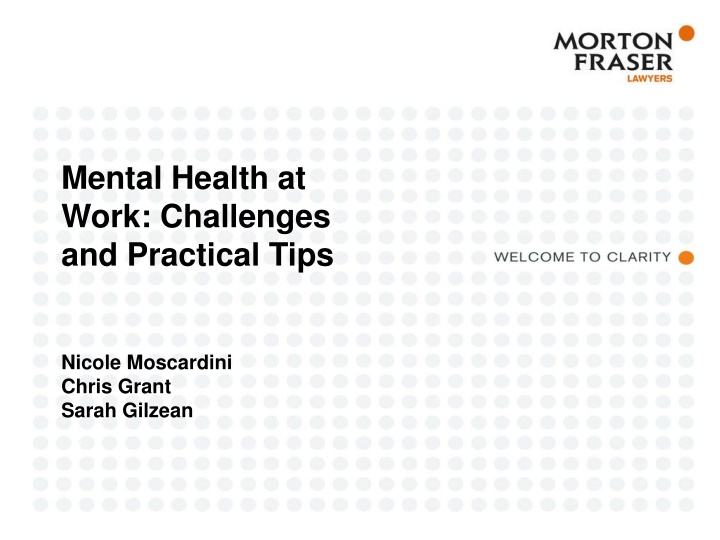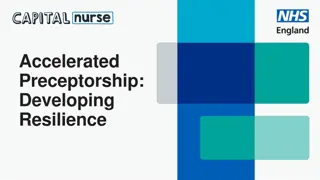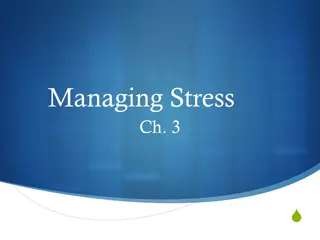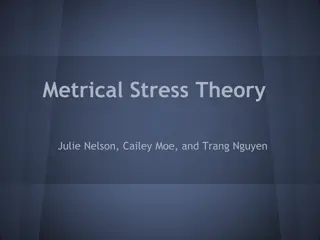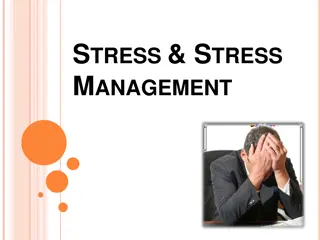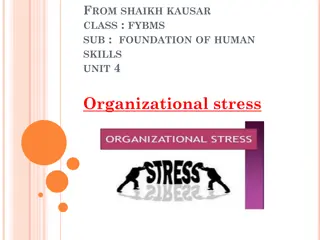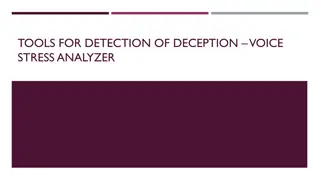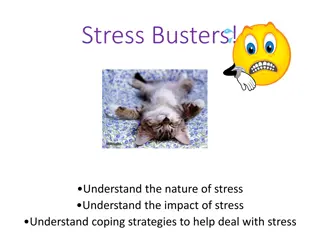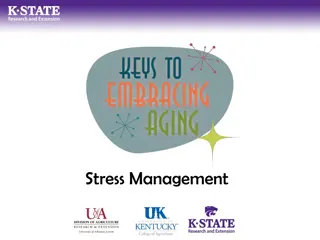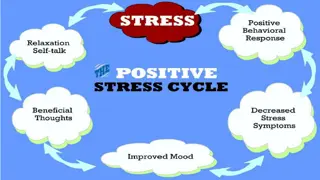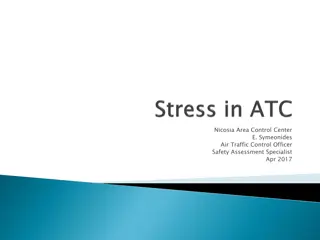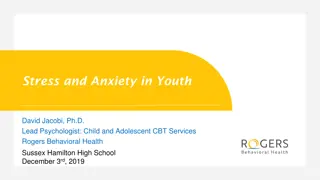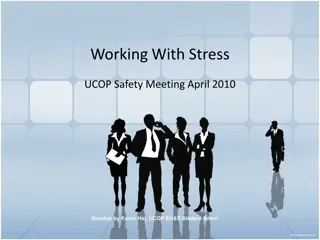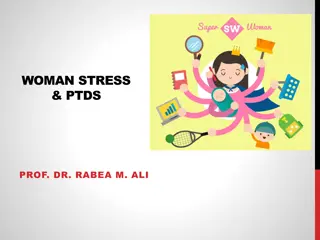Managing Work-Related Stress: Challenges and Legal Responsibilities
Explore the key factors leading to increased stress levels in the workforce, laws regulating work-related stress, stress risk assessments, reasonable adjustments for employees, and ACAS guidance on making necessary accommodations for mental health in the workplace. Learn about the essential steps in stress risk assessments and the importance of creating supportive employment documents to address mental health issues effectively.
Download Presentation

Please find below an Image/Link to download the presentation.
The content on the website is provided AS IS for your information and personal use only. It may not be sold, licensed, or shared on other websites without obtaining consent from the author.If you encounter any issues during the download, it is possible that the publisher has removed the file from their server.
You are allowed to download the files provided on this website for personal or commercial use, subject to the condition that they are used lawfully. All files are the property of their respective owners.
The content on the website is provided AS IS for your information and personal use only. It may not be sold, licensed, or shared on other websites without obtaining consent from the author.
E N D
Presentation Transcript
Mental Health at Work: Challenges and Practical Tips Nicole Moscardini Chris Grant Sarah Gilzean
What leads to increased stress levels in a workforce? Six areas of work that can lead to increased stress levels: 1. Demand 2. Control 3. Support 4. Relationships 5. Role 6. Change
The law on work-related stress Health and Safety at Work etc Act 1974 Management of Health and Safety at Work Regulations 1999 Equality Act 2010 Disability Discrimination Working Time annual, weekly or daily rest, annual leave 48 hour week
Stress Risk Assessments Step 1: Identify the hazards Step 2: Analyse the risks Step 3: Control the risks Step 4: Keep a record of your findings Step 5: Review the assessment regularly
Reasonable adjustments Duty to make reasonable adjustments where: a provision, criterion or practice applied by or on behalf of the employer; or a physical feature of the employer s premises; or the non-provision of an auxiliary aid or service ...puts a disabled person at a substantial disadvantage in comparison with non-disabled people
ACAS Guidance on making reasonable adjustments The guidance covers:- What reasonable adjustments for mental health are Examples of reasonable adjustments for mental health Requesting reasonable adjustments for mental health Responding to reasonable adjustments for mental health requests Managing employees with reasonable adjustments for mental health Reviewing policies with mental health in mind Legal duty to make reasonable adjustments only arises for a "disabled person" under the Equality Act 2010, but it is best practice, and recommended by ACAS, that employers make adjustments to meet the needs of any of their workers who might benefit from such adjustments
Employment documents Ensuring appropriate signposting for employees who need mental health support and developing consistent policy and good practice E.g. Absence management Stress risk assessment Return to work processes Bullying & harassment policy Whistleblowing Maternity and other family policies
Support from employers Employee assistance programme Support via Occupational Health Access to counselling service Increasing awareness of mental health issues across the workforce Mental health first aid training Promotion of flexible working options
Support from employers Mental health/wellbeing champions Training managers to support staff with mental ill health Training for staff to build personal resilience (e.g. coping techniques, mindfulness) Training and educating staff to look out for signs an employee may be suffering from high levels of stress Increased focus on identifying mental ill health among staff who work remotely
What about the duty of employees? Taking breaks Raising any issues with employer Setting boundaries Designated work space Set working hours
Risk to employers if they dont get this right High levels of absenteeism High turnover of staff Negative impact on culture and reputation Employment tribunal claims: disability discrimination, constructive dismissal, unfair dismissal, personal injury and failure to make reasonable adjustments
Stress flows into the container THE STRESS CONTAINER If the container overflows - problems can develop Positive coping mechanisms and support can help stop the container overflowing
1. WELLBEING Are you safe and well? I'm here to listen and help where I can. I particularly want to know if there are areas where your work is impacting your well-being: Do you feel physically and psychologically safe, and is your work and life being balanced in a way that is compatible with your mental health.
2. READINESS Are you set up to succeed? Do you have everything you need to meet the expectations set for you, starting with a clear understanding of what those expectations are?
3. OBSTACLES Looking ahead, what is standing in your way? One of my primary roles as your manager is to help identify and clear obstacles to your progress. Let me know what you need from me to help me help you.
4.RECOGNITION Since we last met, what did you accomplish that you feel good about? Let's mark down every win as we go.
5. FEEDBACK Making space for quick informal bits of feedback ("You were awesome in that meeting.") and in both directions. Feedback for you, feedback for me.
WHAT DOES THIS DO? Making a personal connection Colleague agencys Identifying stressors Regular and not project specific contact Creating open-ness to talk about bigger challenges
Some recent cases Maxwell v HBOS Plc 4105793/202 Depression exacerbated by restructure Weekly check-in meetings Referral to various support networks (EAP) Wellness plan to record discussions and actions Occupational Health assessment BUPA counselling Stress risk assessment Reduced hours, discretionary breaks and a phased return Attempt to find a mental health advocate
Maxwell v HBOS Plc 4105793/202 Followed each stage of Health, Wellbeing and Attendance Policy Final review stage aware potential outcome was dismissal M s only suggestions were redundancy or ill health retirement Dismissal = fair Efforts to accommodate concerns and bring employee back to work Not obliged to offer redundancy or IHR
J McAllister v Commissioners for HMRC [2022] EAT 87 High level of absence not all mental health related Final absence arose from disability and apparently work related OH referrals Reasonable adjustments considered Impact on productivity and staff morale Dismissal fair and although related to disability, was objectively justified: Ensuring adequate attendance and fairly managing sickness absence
